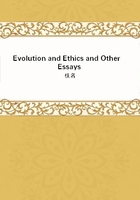
第31章
But if we may permit ourselves at larger hope of abatement of the essential evil of the world than was possible to those who, in the infancy of exact knowledge, faced the problem of existence more than a score of centuries ago, I deem it an essential condition of the realization of that hope that we should cast aside the notion that the escape from pain and sorrow is the proper object of life.
We have long since emerged from the heroic childhood of our race, when good and evil could be met with the same "frolic welcome;" the attempts to escape from evil, whether Indian or Greek, have ended in flight from the battle-field; it remains to us to throw aside the youthful overconfidence and the no less youthful discouragement of nonage. We are grown men, and must play the man "...strong in will To strive, to seek, to find, and not to yield," cherishing the good that falls in our way, and bearing the evil, in and around us, with stout hearts set on diminishing it. So far, we all may strive in one faith towards one hope:
"... It may be that the gulfs will wash us down, It may be we shall touch the Happy Isles, ... but something ere the end, Some work of noble note may yet be done."
I have been careful to speak of the "appearance" of cyclical evolution presented by living things; for, on critical examination, it will be found that the course of vegetable and of animal life is not exactly represented by, the figure of a cycle which returns into itself. What actually happens, in all but the lowest organisms, is that one part of the growing germ (A) gives rise to tissues and organs; while another part (B) remains in its primitive condition, or is but slightly modified. The moiety A becomes the body of the adult and, sooner or later, perishes, while portions of the moiety B are detached and, as offspring, continue the life of the species. Thus, if we trace back an organism along the direct line of descent from its remotest ancestor, B, as a whole, has never suffered death; portions of it, only, have been cast off and died in each individual offspring.
Everybody is familiar with the way in which the "suckers" of a strawberry plant behave. A thin cylinder of living tissue keeps on growing at its free end, until it attains a considerable length. At successive intervals, it develops buds which grow into strawberry plants; and these become independent by the death of the parts of the sucker which connect them. The rest of the sucker, however, may go on living and growing indefinitely, and, circumstances remaining favourable, there is no obvious reason why it should ever die. The living substance B, in a manner, answers to the sucker. If we could restore the continuity which was once possessed by the portions of B, contained in all the individuals of a direct line of descent, they would form a sucker, or stolon, on which these individuals would be strung, and which would never have wholly died.
A species remains unchanged so long as the potentiality of development resident in B remains unaltered; so long, e.g., as the buds of the strawberry sucker tend to become typical strawberry plants. In the case of the progressive evolution of a species, the developmental potentiality of B becomes of a higher and higher order. In retrogressive evolution, the contrary would be the case. The phenomena of atavism seem to show that retrogressive evolution that is, the return of a species to one or other of its earlier forms, is a possibility to be reckoned with. The simplification of structure, which is so common in the parasitic members of a group, however, does not properly come under this head. The worm-like, limbless Lernoea has no resemblance to any of the stages of development of the many-limbed active animals of the group to which it belongs.
Heracleitus says,[Greek phrase Potamo gar ouk esti dis embenai to suto] but, to be strictly accurate, the river remains, though the water of which it is composed changes--just as a man retains his identity though the whole substance of his body is constantly shifting.
This is put very well by Seneca : "Corpora nostra rapiuntur fluminum more, quidquid vides currit cum tempore; nihil ex his quae videmus manet. Ego ipse dum loquor mutari ista, mutatus sum. Hoc est quod ait Heraclitus 'In idem flumen bis non descendimus.' Manet idem fluminis nomen, aqua transmissa est. Hoc in amne manifestius est quam in homine, sed nos quoque non minus velox cursus praetervehit."
"Multa bona nostra nobis nocent, timoris enim tormentum memorin reducit, providentia anticipat. Nemo tantum praesentibus miser est."
Among the many wise and weighty aphorisms of the Roman Bacon, few sound the realities of life more deeply than "Multa bona nostra nobis nocent." If there is a soul of good in things evil, it is at least equally true that there is a soul of evil in things good: for things, like men, have "les defauts de leurs qualites." It is one of the last lessons one learns from experience, but not the least important, that a heavy tax is levied upon all forms of success, and that failure is one of the commonest disguises assumed by blessings.